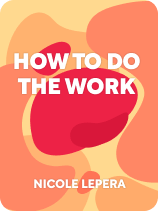

This article is an excerpt from the Shortform book guide to "How to Do the Work" by Nicole LePera. Shortform has the world's best summaries and analyses of books you should be reading.
Like this article? Sign up for a free trial here.
What are self-sabotaging habits? Why are they harmful? How can you identify your own habits that sabotage you?
According to psychologist and bestselling author Nicole LePera, many people engage in self-sabotaging habits that prevent them from being happy. Despite their efforts to change, they end up reverting to their unwanted behaviors and feel powerless to adopt healthier patterns.
Read on to learn how to identify and change self-sabotaging habits, according to LePera.
Identify Your Self-Sabotaging Habits
To define the self-sabotaging habits you want to change, you need to reflect on the unwanted circumstances in your life and identify how they make you think, feel, and behave.
LePera suggests that you reflect on the unwanted situations in your life. Then, write down what types of thoughts and emotions these situations trigger and how they influence your behavior. For example, each time your partner neglects you, you think about how worthless you are and feel pain. You attempt to suppress this pain by binge-watching TV. Thus, you identify two self-sabotaging habits:
- Thinking negatively—because it makes you feel more worthless and intensifies your pain.
- Binge-watching TV—because it prevents you from taking action to change the way you feel.
(Shortform note: James Clear (Atomic Habits) suggests a complementary exercise to help you complete LePera’s exercise: Track your actions and emotions. This will take you beyond simple reflection to develop real-time awareness of your unconscious behaviors and their effect on you. As a result, you’ll find it easier to recognize all the ways self-sabotaging patterns show up in your life.)
| Advice on Defining Your Self-Sabotaging Patterns Psychologists expand on this step with practical advice for identifying your self-sabotaging habits. They suggest that you should reflect on times when you: – Blame others for your feelings or circumstances: You don’t explore how you’ve contributed to your issues. As a result, you don’t take responsibility for or learn from your experiences. – Abandon your goals: Instead of making an effort to fulfill your needs, you allow setbacks and difficulties to convince you to walk away from what you want. – Procrastinate: You lack the motivation to do what you need to do, are easily distracted, and suffer from self-doubt or feelings of overwhelm. – Antagonize others: You undermine your relationships by provoking arguments, acting inconsiderately, or using passive-aggressive techniques. If acknowledging your self-sabotaging patterns inspires self-critical thoughts, remember that the goal of reflecting on unwanted circumstances isn’t to judge or berate yourself for engaging in unwanted habits, but to increase your awareness of what’s holding you back from the life you want. To overcome any self-critical thoughts, focus on self-compassion during this step. For example, acknowledge that you’ve been doing the best that you can, or consciously forgive yourself for any mistakes that you’ve made. By shifting your focus from criticism to kindness, you’ll be better able to understand your self-sabotaging habits without falling into the trap of self-defeating thoughts. |

———End of Preview———
Like what you just read? Read the rest of the world's best book summary and analysis of Nicole LePera's "How to Do the Work" at Shortform.
Here's what you'll find in our full How to Do the Work summary:
- How childhood conditioning impacts your mental and physical health
- How to develop positive patterns that improve your well-being
- Tools to feel happier, healthier, and more in control of your life






